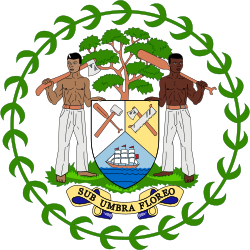| See Belize–United States relations Belize-United States relations have traditionally been close and cordial. The United States is Belize's principal trading partner and major source of investment funds. It is also home to the largest Belizean community outside Belize, estimated to be 70,000 strong. Because Belize's economic growth and accompanying democratic political stability are important U.S. objectives, Belize benefits from the U.S. Caribbean Basin Initiative. As a member of CARICOM Belize strongly backed efforts by the United States to implement United Nations Security Council Resolution 940 designed to facilitate the departure of Haiti's de facto authorities from power. The country agreed to contribute military personnel to the Multinational Task Force which restored the democratically elected Government of Haiti in October 1994 and to the United Nations Mission in Haiti (UNMIH). Belize is also a member of the International Criminal Court with a Bilateral Immunity Agreement of protection for the American military (as covered under Article 98). International crime issues dominate the agenda of bilateral relations between the United States and Belize. The United States is working closely with the Government of Belize to fight illicit narcotics trafficking, and both governments seek to control the flow of illegal migrants to the United States through Belize. Belize and the United States brought into force a stolen vehicle treaty, an extradition treaty, and a Mutual Legal Assistance Treaty between 2001 and 2003. The United States is the largest provider of economic assistance to Belize, contributing $2.5 million in various bilateral economic and military aid programs to Belize in FY 2006. Of this amount, nearly $500,000 was provided by the U.S. Military Liaison Office. The U.S. Agency for International Development (USAID) closed its Belize office in August 1996 after a 13-year program during which USAID provided $110 million worth of development assistance to Belize. Belize still benefits from USAID regional programs. In addition, during the past 42 years, almost 2,000 Peace Corps volunteers have served in Belize. As of April 2007, the Peace Corps had 58 volunteers working in Belize. Until the end of 2002, Voice of America operated a medium-wave radio relay station in Punta Gorda that broadcast to the neighboring countries of Honduras, Guatemala, and El Salvador. The U.S. military has a diverse and growing assistance program in Belize that included the construction and renovation of several schools and youth hostels, medical assistance programs, and drug reduction programs. Private North American investors continue to play a key role in Belize's economy, particularly in the tourism sector. | 

